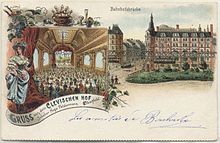Alfred Heinen
Alfred Heinen , actually Alfred Levy or Alfred Levi (born August 25, 1880 in Mönchengladbach ; † July 9, 1943 in the Sobibor extermination camp ) was a German entertainer and Rhenish singer.
Life
Heinen was born as Alfred Levy in Mönchengladbach and learned the trade after finishing school. His stage career began around 1900 with an extra role at a Cologne theater. He got his first engagement as an entertainer at the Varieté in the hotel "Clevescher Hof" in Elberfeld . From then on he called himself Alfred Heinen and became a variety singer. His success in this subject soon helped him to get involved outside of the Rhineland, for example in Hamburg at the Hansa-Theater and in Berlin, where he also appeared in the Varieté Wintergarten .
Before the seizure of power by the National Socialists Heinen worked in a bar in the Zeppelinstraße of Cologne as a singer and parodist. In July 1933 he had to leave Germany with his family and fled to Holland, where he took up an apartment in Amsterdam at Velazquezstraat 19 and found employment again as an entertainer. After the Wehrmacht invaded Holland, he and his wife Selma were deported from the Westerbork transit camp to the Sobibor camp on January 9, 1943, where they were killed. Her daughter Margot died in Auschwitz on November 30, 1943.
There are recordings of him on Odeon and Ultraphon , with songs by Martin Loewe , Willi Ostermann , Franz Strassmann and Emil Spielmann.
Sound documents (selection)
- I was born on the Rhine (Fr. Strassmann) Odeon O-2864 (Be 8156) May 1929
- I'm longing for old Cologne (M. Loewe) Odeon O-2864 (Be 8159)
- So I advise you: move to the Rhine (W. Ostermann) Odeon O-11 123 (Be 8566) October 1929
- Where the mountains glow (text: Emil Spielmann, music: Kassbohm) Odeon O-11 125 (Be 8567)
- Yes, people don't have time today. Couplet (M. Loewe) Odeon O-11 126 (Be 8571)
- It's carnival (text: Heinen, music: Henry Kassbom [d. I. Hans Kassebaum]) Ultraphon A 679 (mx. 15,500), recorded in November 1930
- 'ne richtije Fastelovendsjeck de is happy about any dirt (text: Heinen, music: Henry Kassbom) Ultraphon A 679 (mx. 15 501), recorded in November 1930
- Speak out calmly, my child (Text: Heinen, Music: Henry Kassbom) Ultraphon A 680 (mx. 15 502), recorded in November 1930
- Child, your eyes speak volumes (text: Heinen, music: Henry Kassbom) Ultraphon A 680 (mx. 15 503), recorded in November 1930
Republication
- CD box with 4 CDs “Dat singende un klingende Kölle” contains Alfred Heinen's song “I drink a glass of wine on the Rhine” (TuM F. Straßmann), Odeon O-11 123 (Be 8565). Oct. 1929. (on CD 1, track 6).
literature
- Heinz Büttner, Klaus Krüger, Rainer E. Lotz and Christian Zwarg (eds.): German National Discography. Discography of German cabaret. Volume 6. ISBN 978-3-9805808-7-8 [3-9805808-7-3] Hard cover, 576 pages.
- Berthold Leimbach: Sound documents of cabaret and their interpreters 1898–1945. Göttingen 1991, self-published. Unpaginated.
- Ulrich Liebe: adored, persecuted, forgotten. Actor as a Nazi victim. Weinheim: Beltz Quadriga, 1992. ISBN 3-88679-197-1
- Kay Less : Between the stage and the barracks. Lexicon of persecuted theater, film and music artists from 1933 to 1945 . With a foreword by Paul Spiegel . Metropol, Berlin 2008, ISBN 978-3-938690-10-9 , p. 165.
Web links
- Alfred Heinen in the Bavarian Musicians' Lexicon Online (BMLO)
Individual evidence
- ↑ cf. Love, page 233
- ↑ a b cf. Leimbach 1991
- ↑ a b c Joods Monument - Alfred Levy. In: joodsmonument.nl. Digitaal Monument Joodse Gemeenschap in Nederland, accessed on June 2, 2012 (English).
- ↑ cf. Wanted advertisement from his brother Oscar under construction Friday, May 11, 1945, page 19 (PDF; 523 kB)
- ↑ cf. Obituary in the “Aufbau” from Friday, December 6, 1946, page 35 (PDF; 430 kB)
| personal data | |
|---|---|
| SURNAME | Heinen, Alfred |
| ALTERNATIVE NAMES | Levy, Alfred (real name); Levi, Alfred |
| BRIEF DESCRIPTION | German entertainer and Rhenish singer |
| DATE OF BIRTH | August 25, 1880 |
| PLACE OF BIRTH | Mönchengladbach |
| DATE OF DEATH | July 9, 1943 |
| Place of death | Sobibor extermination camp |
